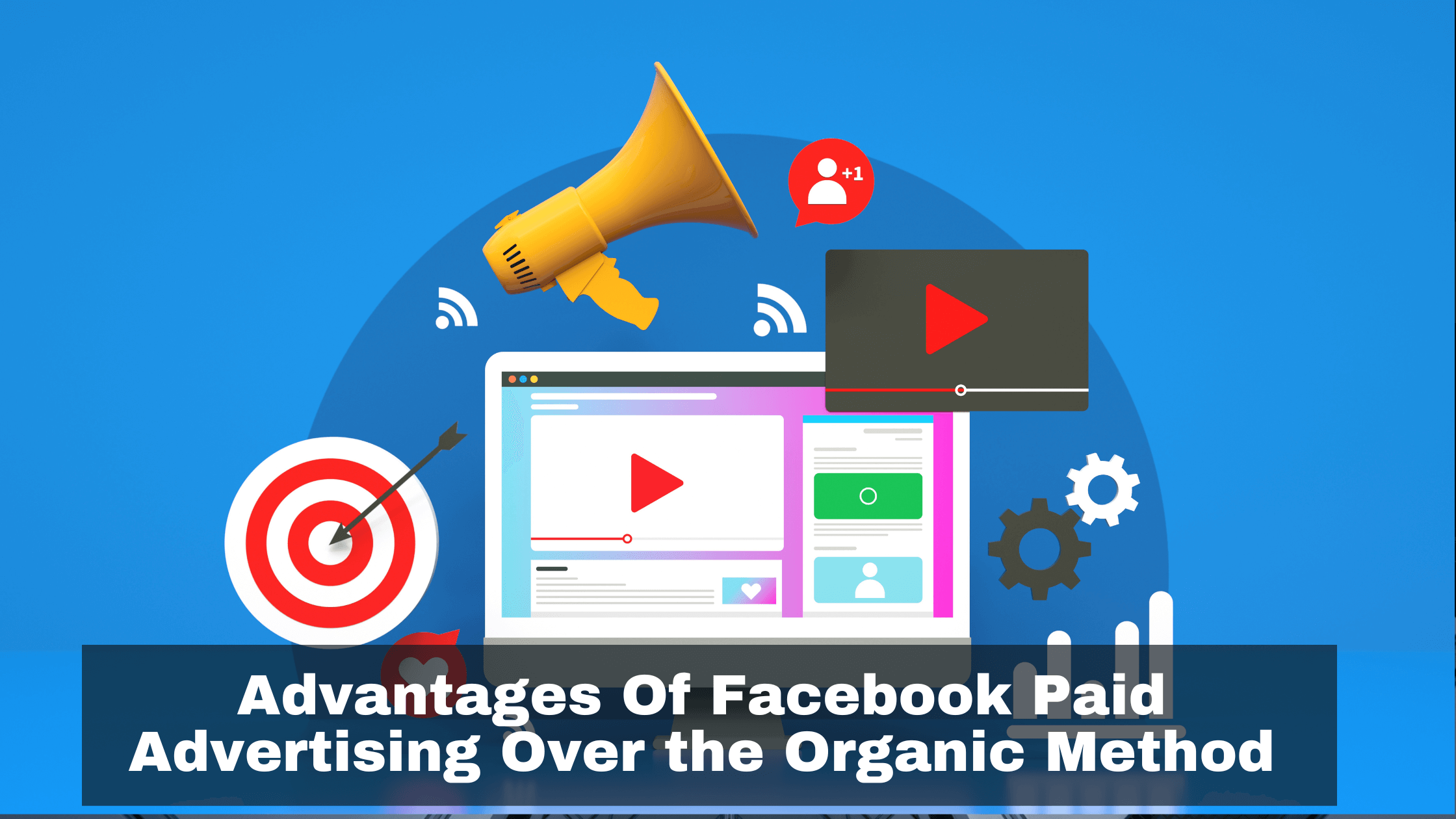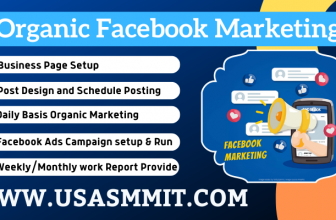
Facebook is the most popular social media platform with over 2 billion monthly active users. That’s a lot of people you could be reaching with your product or service! While organic reach on Facebook has been declining in recent years, paid advertising has become more and more effective.
Here are 5 advantages of using Facebook paid advertising over the organic method:
1. You can target your audience very specifically.
2. You can reach a larger audience than through organic means.
3. Paid ads are more likely to be seen by your target audience.
4. They are less expensive than other forms of advertising such as TV or print ads.
5. You can track the results of your ad campaign to see how well it is performing and make changes accordingly.
Facebook paid advertising has a number of advantages over the organic method. For one, it allows you to target your audience more precisely. You can choose to target by location, demographics, interests, and even behaviors.
This ensures that your ad reaches the people most likely to be interested in what you have to say or sell. Another advantage of Facebook paid advertising is that it gives you more control over the timing and frequency of your ads. With organic reach, your posts are only seen by people who happen to be scrolling through their newsfeeds at the right time.
With paid advertising, you can determine exactly when and how often your ad is shown, giving you a better chance of catching someone’s attention. Finally, Facebook paid advertising is simply more effective than organic reach when it comes to promoting something on the platform. A well-designed and targeted ad will reach far more people than a post that relies on organic sharing alone.
If you’re serious about getting your message out there on Facebook, Paid Advertising is the way to go.
What is the Difference between Organic And Paid Marketing on Facebook?
Organic Facebook marketing refers to the unpaid posts and interactions that you have with your fans and followers. This can include anything from status updates and photo sharing, to commenting on other people’s posts. Paid marketing, on the other hand, is where you use Facebook Ads to promote your page or website.
With paid marketing, you can target a specific audience with laser precision, and you have a lot more control over the message that you send out.
What is the Difference between Facebook Paid Advertising And Organic Ads?
Paid advertising is a form of marketing where businesses pay to have their ads placed on platforms like Google, Facebook, or Instagram. The main difference between paid and organic advertising is that with paid ads, businesses are guaranteed to have their ad seen by a certain number of people, while with organic ads there is no guarantee that anyone will see the ad. Paid advertising can be an effective way to reach a large audience quickly, but it can also be expensive.
Organic advertising relies on creating content that is interesting and relevant to your target audience, which will hopefully lead them to your website or online store organically (i.e., without you having to pay for it). While organic advertising takes longer to build up momentum, it can be more cost-effective in the long run since you’re not paying for each individual ad impression.
What are the Benefits of Facebook Ads?
Facebook Ads can be a great way to reach new customers and grow your business. Here are some benefits of Facebook Ads:
1. Reach a large audience: With over 2 billion active users, Facebook is one of the largest social media platforms in the world. This gives you the opportunity to reach a huge audience with your ads.
2. Target your ads: Facebook allows you to target your ads based on interests, demographics, and behaviors. This ensures that your ads are being seen by people who are most likely to be interested in what you’re selling.
3. Cost-effective: Facebook Ads are very cost-effective, especially when compared to other forms of advertising such as TV or print ads. You can set a budget for your ad campaign and only pay when people click on your ad (CPP).
4. Measurable results: Unlike many other forms of advertising, with Facebook Ads you can track how well your ad is performing and make changes accordingly.
You can see how many people have seen your ad, how many have clicked on it, and what actions they’ve taken afterwards (e.g., if they’ve made a purchase).
Which is Better Organic Or Paid?
There is a lot of debate over which is better, organic or paid traffic. Each has its own set of pros and cons that should be considered before making a decision. Organic traffic is the traffic you get from unpaid or natural sources, like search engines or social media.
The main advantage of organic traffic is that it’s free – you don’t have to pay for it. However, generating organic traffic can take a lot of time and effort, particularly if your website is new. It can also be difficult to measure the results of your organic marketing campaigns, making it hard to know whether they’re really worth the investment.
Paid traffic, on the other hand, is any kind of advertising where you do have to pay for each click or impression. The most common form of paid traffic is PPC (pay-per-click), but there are other types too, such as cost-per-impression (CPM) advertising. Paid traffic can be an effective way to generate quick results, and it’s easier to track and measure than organic traffic.
However, it can be expensive – especially if you’re bidding on popular keywords – and there’s always the risk that your ads will be clicked on by people who aren’t actually interested in what you have to offer. So which one should you choose? Ultimately, it depends on your budget, your goals and how much time and effort you’re willing to put into generating results.
If you want quick results with minimal effort then paid traffic might be the best option for you. But if you want to build long-term success without breaking the bank then organic traffic could be a better choice in the long run.
Disadvantages of Facebook Advertising
Facebook advertising is not without its disadvantages. One of the most significant disadvantages is that Facebook ads can be very expensive. The cost of Facebook ads can vary greatly depending on the targeting options you select, but they can often be quite costly compared to other forms of advertising.
Additionally, Facebook ads tend to have a relatively short shelf life and need to be constantly refreshed in order to remain effective. This can make it difficult to sustain a long-term ad campaign on Facebook. Another downside of Facebook advertising is that it can be very easy for users to tune out or ignore your ads if they are not relevant or interesting to them.
This is why it’s important to target your ads carefully and create compelling ad copy that will grab attention and hold interest. Finally, some users may feel like they are being bombarded with too many ads when using Facebook, which could lead them to take a break from the platform entirely.
How to Stop Ads on Facebook
We all know how annoying ads can be, especially when we’re trying to scroll through our Facebook feed and they pop up out of nowhere. But what if we told you that there’s a way to stop those pesky ads from interrupting your social media browsing? Here’s a step-by-step guide on how to stop ads on Facebook:
1) Log into your Facebook account and click on the down arrow in the top right corner.
2) Select ‘Settings’ from the drop-down menu.
3) Click on the ‘Ads’ tab located on the left side of the page.
4) Under the ‘Ads that show up in News Feed’ section, select ‘No one.’
5) Save your changes by clicking on the blue ‘Save Changes’ button at the bottom of the page. And that’s it!
By following these simple steps, you’ll no longer have to deal with seeing unwanted ads while scrolling through your Facebook feed.
Conclusion
Organic reach on Facebook is declining. That’s why more and more businesses are turning to paid advertising on Facebook to reach their target audiences. Paid advertising on Facebook has a number of advantages over the organic method, including:
1. You can target your ads to very specific audiences.
2. You have more control over the placement and timing of your ads.
3. Paid ads tend to get more clicks and engagement than organic posts.
4. You can track the performance of your ads with detailed insights.



